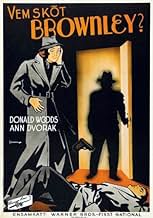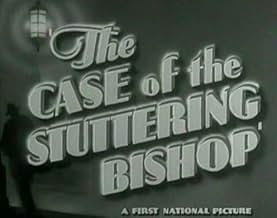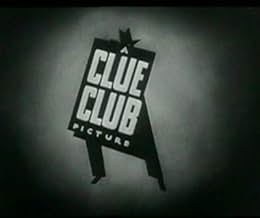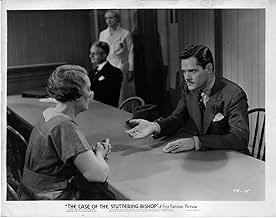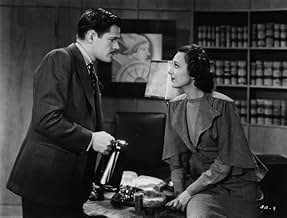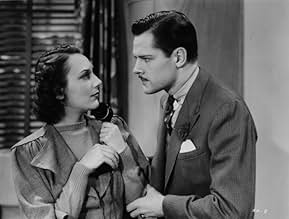Füge eine Handlung in deiner Sprache hinzuAn improbable stuttering bishop from Australia asks for Perry Mason's help in proving the identity of the legitimate heir to a millionaire.An improbable stuttering bishop from Australia asks for Perry Mason's help in proving the identity of the legitimate heir to a millionaire.An improbable stuttering bishop from Australia asks for Perry Mason's help in proving the identity of the legitimate heir to a millionaire.
- Regie
- Drehbuch
- Hauptbesetzung
Helen MacKellar
- Stella Kenwood
- (as Helen McKellar)
Charles C. Wilson
- Hamilton Burger
- (as Charles Wilson)
Eddy Chandler
- Detective James Fleet
- (Nicht genannt)
Empfohlene Bewertungen
You can often tell when a studio is losing interest in a film series when they start replacing the entire cast. In this instance, they did it twice in 2 films-- and by the time of THE CASE OF THE STUTTERING BISHOP, we'd not only seen 3 Perry Masons in 6 films, but 5 different Della Streets! Donald Woods does his 2nd PM film, having played one of the suspects in ...THE CURIOUS BRIDE, while William Clemens directs his 2nd PM film, having already done the relatively sober ...VELVET CLAWS. Clemens would go onto quite a few series films, including a Torchy Blane, 4 Nancy Drews, a Dead Ends Kids, a Philo Vance, and 3 Falcons. There's nothing especially flashy or stylish about this film, and it starts out very confusing, but it is a solid mystery film, and gets better as it goes.
For example, you have the boastful house detective who Perry winds up hiring part-time, and as the story goes on he proves to be genuinely helpful, rather than "merely" comic relief. It seems the murder takes forever to happen in this one, but once it does, the story FINALLY kicks into gear, and the courtroom sequence at the end is probably the BEST in all 6 films. Unlike when Perry rattled off confusing info nobody but HE knew in the previous installment, the quick stream of witness testimonies actually help to pull all the threads of the story together neatly. And at last, there's the patented "blurted out confession" seen in so many PM stories-- only in this case, NOT from the person being grilled on the stand.
It's been said that sometimes casting actors very accurate to novels can lead to dull films. Some of the most popular versions of characters are quite unlike their literary sources-- good examples being Sean Connery's JAMES BOND and Stacy Keach's MIKE HAMMER. In this case, I find myself wishing Warren William had done more films like this one-- his version of Perry might not be thought of as so much of a joke then.
For example, you have the boastful house detective who Perry winds up hiring part-time, and as the story goes on he proves to be genuinely helpful, rather than "merely" comic relief. It seems the murder takes forever to happen in this one, but once it does, the story FINALLY kicks into gear, and the courtroom sequence at the end is probably the BEST in all 6 films. Unlike when Perry rattled off confusing info nobody but HE knew in the previous installment, the quick stream of witness testimonies actually help to pull all the threads of the story together neatly. And at last, there's the patented "blurted out confession" seen in so many PM stories-- only in this case, NOT from the person being grilled on the stand.
It's been said that sometimes casting actors very accurate to novels can lead to dull films. Some of the most popular versions of characters are quite unlike their literary sources-- good examples being Sean Connery's JAMES BOND and Stacy Keach's MIKE HAMMER. In this case, I find myself wishing Warren William had done more films like this one-- his version of Perry might not be thought of as so much of a joke then.
Most of Edward McWade's roles were uncredited, but he certainly paid his dues in film-making; he had been making movies since 1919. Here he plays the stuttering bishop, who shows up at the office of Perry Mason (Donald Woods this time... Warren William had been playing Perry Mason for most of the 1930s.) with a case, then disappears. He makes accusations against the local rich man, Renald Brownley, played by Douglas Wood. Anne Dvorak and Joseph Crehan in supporting roles, as Mason confronts Brownley and tries to sort out the clues and what's going on. People start turning up dead, people are fighting, and then we're in the courtroom, like any good episode of Perry Mason. There are some comical moments, mostly between Mason and Della Street, and the names are a little confusing, with a Della, a Stella, TWO girls named Janice, and even an Ida. It's solid enough, with the usual court-room drama and outbursts. Directed by William Clemens, who had also directed many of the Nancy Drew and The Falcon films.
Case of the Stuttering Bishop, The (1937)
** 1/2 (out of 4)
Sixth and final film in Warner's Perry Mason series features a new guy in the lead role but the film turns out to be a rather entertaining entry. This time out, Perry Mason (Donald Woods) is visited by a bishop who asks him to investigate a manslaughter that happened twenty-two years earlier but the guilty party is still free. Perry starts to investigate, which leads him to a billionaire who eventually winds up dead and it seems the same person is behind the two cases. This is a pretty strong film that manages to be quite entertaining, although it would have benefited by a stronger supporting cast. Woods is actually very good in the role of Mason and brings his own charm and brains to the role. Ann Dvorak is entertaining as his secretary but the rest of the cast is so-so at best. The case is actually very well written and manages to be quite complicated, which ruins the ending when we get the typical easy way out and that's the guilty person getting away with it until they break down and admit everything.
** 1/2 (out of 4)
Sixth and final film in Warner's Perry Mason series features a new guy in the lead role but the film turns out to be a rather entertaining entry. This time out, Perry Mason (Donald Woods) is visited by a bishop who asks him to investigate a manslaughter that happened twenty-two years earlier but the guilty party is still free. Perry starts to investigate, which leads him to a billionaire who eventually winds up dead and it seems the same person is behind the two cases. This is a pretty strong film that manages to be quite entertaining, although it would have benefited by a stronger supporting cast. Woods is actually very good in the role of Mason and brings his own charm and brains to the role. Ann Dvorak is entertaining as his secretary but the rest of the cast is so-so at best. The case is actually very well written and manages to be quite complicated, which ruins the ending when we get the typical easy way out and that's the guilty person getting away with it until they break down and admit everything.
The Perry Mason series of mysteries from the 1930s are some of the best mysteries one could watch. One needs to pay attention to details throughout the film to follow the twists in the plot, which in this movie is very complicated. The movies closely follow the Erle Stanley Gardner mystery novels on which they are based. The Case of the Stuttering Bishop holds one's interest from beginning to end as Perry Mason cleverly addresses the case of a murder committed over a will, inheritance and the fraudulent identity of a key player. Donald Woods does not play the role of Perry Mason as well as Warren William did in this series. William plays the role with panache and wit, whereas Donald Woods plays the role straightforward with no flair—serviceable but not exciting. Ann Dvorak plays the role of Della Street straightforward also with none of the sassiness and cuteness of Genevieve Tobin and none of the glamour and screen presence of Helen Trehnolme in other movies in the series. If you are a fan of old, intriguing mysteries, you won't be disappointed with this gem.
Donald Woods and Ann Dvorak were fine as Perry Mason and his secretary, Della Street, but it took me a while to get used to not seeing Raymond Burr in the Mason role. The complicated plot involves two women named Janice who claim to be the heir to the fortune of Douglas Wood, and an Australian bishop who asks Mason to see Mira McKinney, who can prove which one is the real one. But Wood is killed going to the rendezvous with McKinney, who is charged with murder. In customary Perry Mason style, there is a final courtroom scene (in this case only a hearing) where Mason flushes out the killer and the phony Janice. I enjoyed trying to follow the plot and the comedy that was prevalent. Tom Kennedy suddenly remembers an important item when he hears the name "Sampson," because it involves a ship called "Delilah." Woods always asking Dvorak to remind him to give her a raise when she gets a good idea (a running gag). Even the bishop, who explains he stutters only when under some emotional stress, provides some comedy at the end. He sheepishly stammers "g-g-goodness g-g-gracious" when three of the principal women kiss him goodbye.
Wusstest du schon
- WissenswertesAuthor Erle Stanley Gardner objected so vehemently to what he felt was the miscasting of Ricardo Cortez as Mason, that Warners replaced him with Donald Woods.
- PatzerNear the end, when Mason and his crew are having lunch during a court recess, Della drops her fork on her plate and reaches out across the table to break off some bread (after giving Mason the inadvertent hunch about Stella Kenwood). When the camera cuts back to Mason, Della has fork in hand again, but not the bread.
- Zitate
Perry Mason: [to Della] Bishops don't often need lawyers. Show him in.
- VerbindungenFeatured in Tote schlafen fest (1946)
- SoundtracksWhen Irish Eyes Are Smiling
(1912) (uncredited)
Music by Ernest Ball
Lyrics by Chauncey Olcott and George Graff
Sung a cappella with a phony Irish brogue by Donald Woods
Top-Auswahl
Melde dich zum Bewerten an und greife auf die Watchlist für personalisierte Empfehlungen zu.
Details
- Erscheinungsdatum
- Herkunftsland
- Sprache
- Auch bekannt als
- Clue Club #10: The Case of the Stuttering Bishop
- Drehorte
- Produktionsfirma
- Weitere beteiligte Unternehmen bei IMDbPro anzeigen
- Laufzeit1 Stunde 10 Minuten
- Farbe
- Sound-Mix
- Seitenverhältnis
- 1.37 : 1
Zu dieser Seite beitragen
Bearbeitung vorschlagen oder fehlenden Inhalt hinzufügen

Oberste Lücke
By what name was The Case of the Stuttering Bishop (1937) officially released in India in English?
Antwort
